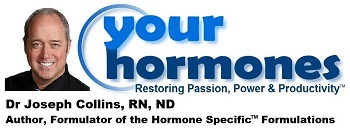
TestoQuench™ for Men Herbs
Serenoa repens interferes with in excessive androgen function and protects prostate health through various distinct processes. Serenoa repens significantly decreases the formation of DHT (the active androgen on prostate cell proliferation) by its ability to inhibit both type 1 and type 2 isoenzymes of 5 alpha-reductase. Serenoa repens interferes with binding of dihydrotestosterone to cytosolic and whole cell androgen receptor (AR) and notably down- regulates the level of androgen receptor in the nucleus. Serenoa repens strongly inhibits 3 ketosteroid reductase mediated conversion of DHT to 5 alpha-androstane-3 alpha, 17beta- diol (3alpha-diol). In addition to the potent androgens, 5alpha-androstane-3alpha, 17beta-diol (3alpha-diol) activated signaling may represent a novel pathway responsible for the progression to androgen-independent prostate cancer. Potential accumulation of 3alpha-diol in cancerous prostate may continue to support prostate cancer growth in the presence of androgen deprivation. Future therapeutic strategies for treating advanced prostate cancer might need to block intraprostatic 3alpha-diol accumulation. Serenoa repens can also block prolactin (PRL) a hormone that controls prostate gland growth by inhibiting several steps of PRL receptor signal transduction.
Pygeum africanum interferes with androgen function through the actions of atraric acid and N-butylbenzene-sulfonamide, which are both complete and specific androgen receptor (AR) antagonists. These compounds have been shown to inhibit prostate cell growth. Research suggests antiproliferative and apoptotic on proliferative prostate fibroblasts and myofibroblasts. The androgen antagonistic activity is receptor specific and does not inhibit the closely related glucocorticoid or progesterone receptors. It does not inhibit estrogen receptors. Pygeum africanum inhibits 5 alpha-reductase. It could also suppress the oxidative stress status in diabetic bladder by raising catalase and superoxide dismutase activities significantly, and may slow down the process of diabetic cystopathy.
Piper cubeba extracts restores normal function to androgen-dependent prostate tissue via several mechanisms: Piper cubeba inhibits 5 alpha-reductase II activity in the prostate, which is responsible for converting testosterone to its active form, dihydrotestosterone (DHT); Piper cubeba is an androgen receptor (AR) antagonist, and down-regulated AR levels; and Piper cubeba suppressed cell growth and prostate-specific antigen (PSA) secretion stimulated by physiological concentrations of DHT. In addition to anti-androgenic properties, Piper cubeba also demonstrates anti-estrogenic and anti-inflammatory properties. These results support the potential use of Piper cubeba in phytotherapy against benign prostatic hyperplasia (BPH).
Urtica dioica may have its antiandrogen affect due to β-sitosterol and scopoletin, which have 5α-reductase inhibitory potential. The antiandrogen properties may also be due to some of the long chain fatty acids acids in Urtica dioica such as oleic and linoleic which can cause inhibition of 5alphaR1 and 5alphaR2 activity. Urtica dioica has demonstrated beneficial effects in the treatment of symptomatic BPH, with significant improvement of relief of lower urinary tract symptoms. Urtica dioica also has a normalizing affect on blood sugar.
Ocimum sanctum can decrease androgen function due to antiandrogenic properties, and androgen deprivation which appears to diminish two weeks after the herb is stopped.
Ocimum sanctum is highly regarded as an adaptogen in Ayurvedic medicine, due to significant antistressor properties, which promote recovery from stressors, normalizes corticosterone response to stress, and modulates glycemic and biochemical response to stress. There is also considerable research showing that Ocimum sanctum decreases elevated level of serum glucose and also caused to reverse the cholesterol, triglyceride, HDL and LDL.
Magnolia officinalis is able to protect the health of the prostate through various compouinds. Honokiol, a soluble nontoxic natural product derived from Magnolia Honokiol was shown to inhibit prostate tissue growth, exhibit, apoptotic (programmed cell death), and antiangiogenic effects, and depress serum PSA in mice. Honokiol-induced apoptosis irrespective of their androgen responsiveness of unhealthy human prostate cells. Honokiol, which is used in traditional oriental medicine for the treatment of various ailments, may be an attractive agent for treatment and/or prevention of human prostate cancers. Obovatol, a biphenolic compound found in Magnolia officinalis and other Magnolia species, inhibits prostate cancer cell growth via induction of apoptotic cell death, and that inhibition of NF- kappaB may be a significant as its action mechanism.
